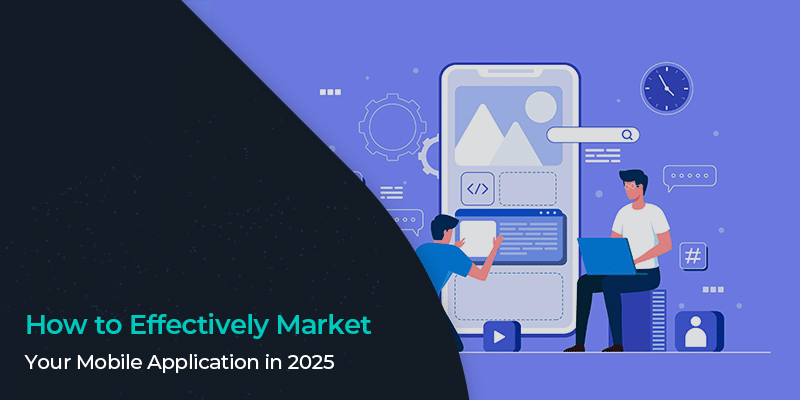Introduction
The mobile app market exhibits fiercer competition than ever because multi-million apps present themselves across different app stores. Your app needs an effective marketing strategy if it wants to stand out in the market. Because of AI-driven analytics with user engagement tactics and the latest digital marketing trends in 2025, a company can achieve substantial results.
Every phase starting from pre-launch publicity to post-launch contributes directly to the achievement of mobile applications. The following guide presents optimal marketing methods to promote your mobile app during 2025.
Pre-Launch Strategy
Research Market & Competitors
Market research about your target audience needs to be performed fully before your mobile app‘s launch. Absorb information about what your customers find troublesome, how they behave, and which choices they prefer. The analysis of competitors will reveal successful and unsuccessful elements in the marketplace.
Building Brand Identity
Your app gains uniqueness from a definitive brand identity. Establish a magnetic combination of the app name together, logo, and tagline that connects with your target audience through any premium mobile app agency. All marketing materials from social media to website content must show consistency so users experience your brand in a lasting way.
Create a Landing Page
Your pre-market interest builds through a landing page that dedicates itself to the upcoming launch. The page requires SEO optimization, interesting visuals, and clear email sign-up instructions through a call-to-action (CTA) by experienced app developers. Set up a visible presence on social media platforms that house your target audience.
App Store Optimization (ASO)
Your app discovery depends on App Store Optimization (ASO). The process requires research of appropriate keywords followed by creation of a persuasive app description and captivating visual elements. Optimizing an app listing properly will result in substantial increases of organic downloads which you can also produce through an app development company.
Launch Strategy
Utilize Promotion Marketing
Your app promotion will benefit from establishing partnerships between influencers and affiliates who specialize in your target market niche. These partners can generate appealing content videos for tutorials and application reviews while offering giveaways to attract new users.
Paid Ad Campaigns
Your launch strategy should use paid advertising through Google Ads together with Facebook Ads and TikTok Ads in order to access a bigger audience. UK developers usually test various ad formats including video ads, carousel ads, and interactive ads to discover which ones suit your target users the best.
Broadcast Press Releases
Broadcast your press releases to the major tech blog sites and industry publications that also publish news reports to receive media attention. Story submission to journalists and bloggers allows your app to secure features on TechCrunch, Mashable, or Product Hunt which brings additional visibility.
Include Referral Programs
Your marketing presentation works better when you give referrers incentives to talk about your application to others. Users who earn rewards along with discounts together with in-app benefits for referring friends enhance both app download numbers and user retention.
Post-Launch Growth Strategy
ASO Optimization
The app listing requires regular updates that include fresh keywords alongside new features and improved visual elements through updated screenshots. Use analytics tools to track ASO performance which will generate data needed to improve search rankings in a targeted way.
Use Push Notifications
Your user engagement increases when you use personalized push notifications together with email campaigns. Your system should use AI segmentation algorithms to deliver content that drives customers toward more usage of your app while preventing them from leaving.
Leverage Social Media
Your audience will interact better on social media when you create interactive content alongside live Q&A sessions and run community-driven campaigns. The development of loyal application communities extends both engagement duration and advocates who promote the platform.
Release Regular Updates
Up-to-date product updates both make your application significant to users and create superior usability. Regular implementation of user feedback along with bug fixes and new feature releases will maintain the interest and satisfaction of your users.
Retention and Monetization Strategies
Gamification & User Rewards
Through gamification elements users can receive badges together with leaderboards and rewards for maintaining engagement with the platform. The combination of customer loyalty programs along with rewards within the app platform drives user commitment to maintain their involvement.
Subscription Models & In-App Purchases
Develop revenue streams through payment methods such as offering free access with restricted content demand-based purchases and monthly subscription options. The introduction of paid exclusive content with unique features to users leads to business revenue expansion.
AI-Powered Personalization
The application uses artificial intelligence and machine learning capabilities to generate customized user interfaces. Individualized recommendation features along with in-app notices and tailored promotional offers help users feel more satisfied to stay as regular app users.
Gathering User Feedback
Users should be prompted to leave reviews along with ratings which you must answer genuinely in a quick manner. The evaluation of user feedback reveals essential improvement zones that support the betterment of the entire application experience.
Conclusion
The mobile app marketing strategy for 2025 depends on multiple interconnected aspects that combine smart data-based methods original customer retention systems and persistent improvements.




